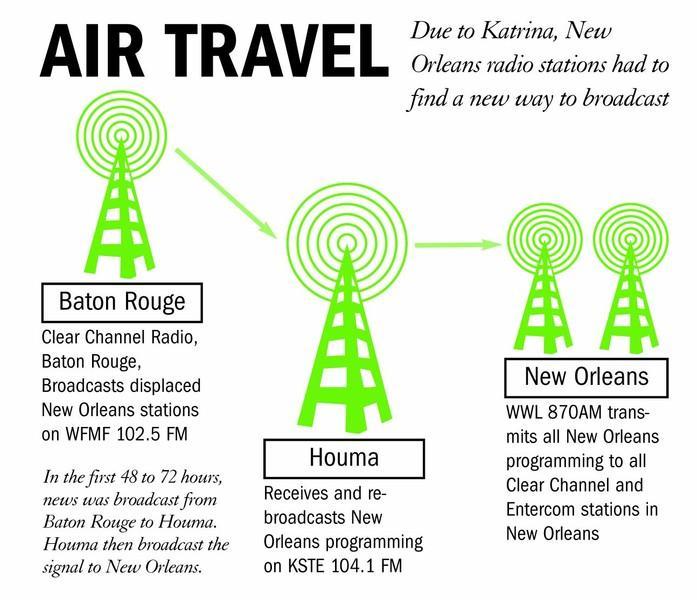In American business, it is unusual – if not unheard of – for two competing companies to unite and use the same facilities, equipment and personnel.
But Clear Channel and Entercom from New Orleans have come together – under the United Radio Broadcasters of New Orleans banner – in the Baton Rouge Clear Channel Broadcasting offices in a historical symbiosis to provide information to those devastated by Hurricane Katrina.
The seven New Orleans Clear Channel and four Entercom stations were relocated to the Baton Rouge Clear Channel offices Aug. 29 after the hurricane slammed into the Gulf Coast, and within 24 hours the stations were broadcasting again. It was not a perfect process, but it got the information out.
“Last Monday was … chaos,” said Matt Kennedy, the program director of WJBO-AM station in Baton Rouge. “We built [the extra studios] in under 24 hours.”
Kennedy said for the first 48 to 72 hours, the New Orleans stations had to be transmitted from a Houma radio station, since all of their transmitters were down.
KSTE-FM, the Clear Channel station in Houma, had to be used as a transmitter to send the broadcasts from Baton Rouge to WWL-AM station in New Orleans, the only transmitter in New Orleans that was working.
Kennedy said this enabled the stations to keep running informative updates even though their own transmitters were unreachable. The transmitters in New Orleans are now on a satellite feed and have been running on generators for almost two weeks.
This occurred within 24 hours of the hurricane hitting, Kennedy said. The next 48 hours were spent rescuing Clear Channel and Entercom personnel from their offices in New Orleans.
The Baton Rouge Clear Channel offices also helped New Orleans employees find places to stay in Baton Rouge.
The United Radio partnership is something never before seen in the history of Louisiana Radio Broadcasting.
Kennedy said United Radio is broadcasting a simulcast, meaning personalities from both Clear Channel and Entercom stations are combining and doing continuous reports that are sent to all Clear Channel and Entercom stations in New Orleans.
No matter which New Orleans Clear Channel and Entercom stations a person in New Orleans listens to, it will be the same broadcast, but it will be limited to news, information and call-in format.
Kennedy said Baton Rouge stations also did all news, information and call-ins, but they are returning to their normal format.
Kennedy said the needs of the Baton Rouge community are different than those of New Orleans citizens. Baton Rouge residents, while still concerned about New Orleans, are more directly affected by traffic problems and other secondary effects of the hurricane.
Kennedy said the situation has been chaotic, but people have been working together like never before.
“The sharing [of information] has been invaluable to us,” Kennedy said.
He said the stations have been combining information and resources, and the public has been able to benefit from it.
Andy Holt, program director for WTKL-FM and WLMG-FM – Entercom stations in New Orleans – said the two companies have always had a “very respectful and congenial relationship.”
Holt said the three functions of United Radio are:
̢ۢ to act as a radio bulletin board and distress signal for the public, help find or check on loved ones and situations
̢ۢ to act as a conduit for public officials to inform the public
̢ۢ to act as a discussion board for questions and concerns.
All of this is solely to benefit the public.
The public good is the reason the Federal Communications Commission has allowed this pseudo-monopoly to flourish.
Kennedy said typically, one company can only own six stations in Baton Rouge and eight in New Orleans, but in this time of crisis, the FCC has allowed Clear Channel and Entercom to come together as United Radio to better serve the public.
While things are running more smoothly every day with everyone crammed onto the fifth floor of their building, it is impossible not to notice the evidence of a quickly organized move.
Boxes are piled up in hallways; studios have been thrown together where waiting rooms and offices once were; New Orleans employees wear name tags – akin to those made at summer camp – to identify themselves in the onslaught of new personnel.
Many Baton Rouge employees have to share offices and desks with employees from New Orleans.
Jim Owens, an operations director from Clear Channel in New Orleans, is one such displaced employee.
Owens said that even though it is hectic, everyone is working together.
Evidence of this camaraderie is present on the motivational posters hanging on the wall. Where it once read “Clear Channel: Make Budget Beat Market” it now reads, with changes made in red marker, “Clear Channel and our Entercom Family: Help Humanity.”
“We’re making it up as we go along,” Owens said. “The situation will be in transition for a while … everyday we make a change. Everyday there’s been an improvement.”
Kennedy said the main focus of United Radio is to help and inform the evacuees and provide information for those who need it. The New Orleans stations, at least for the time being, have completely changed their formats.
“There’s no real timetable, yet, of how long this thing’s going to last,” Kennedy said. “The newest Jay-Z song just isn’t the most important thing for us to put on the radio now.”
Contact Zachary Broussard at zbroussard@lsureveille.com
CROWDED AIRWAVES
September 15, 2005





